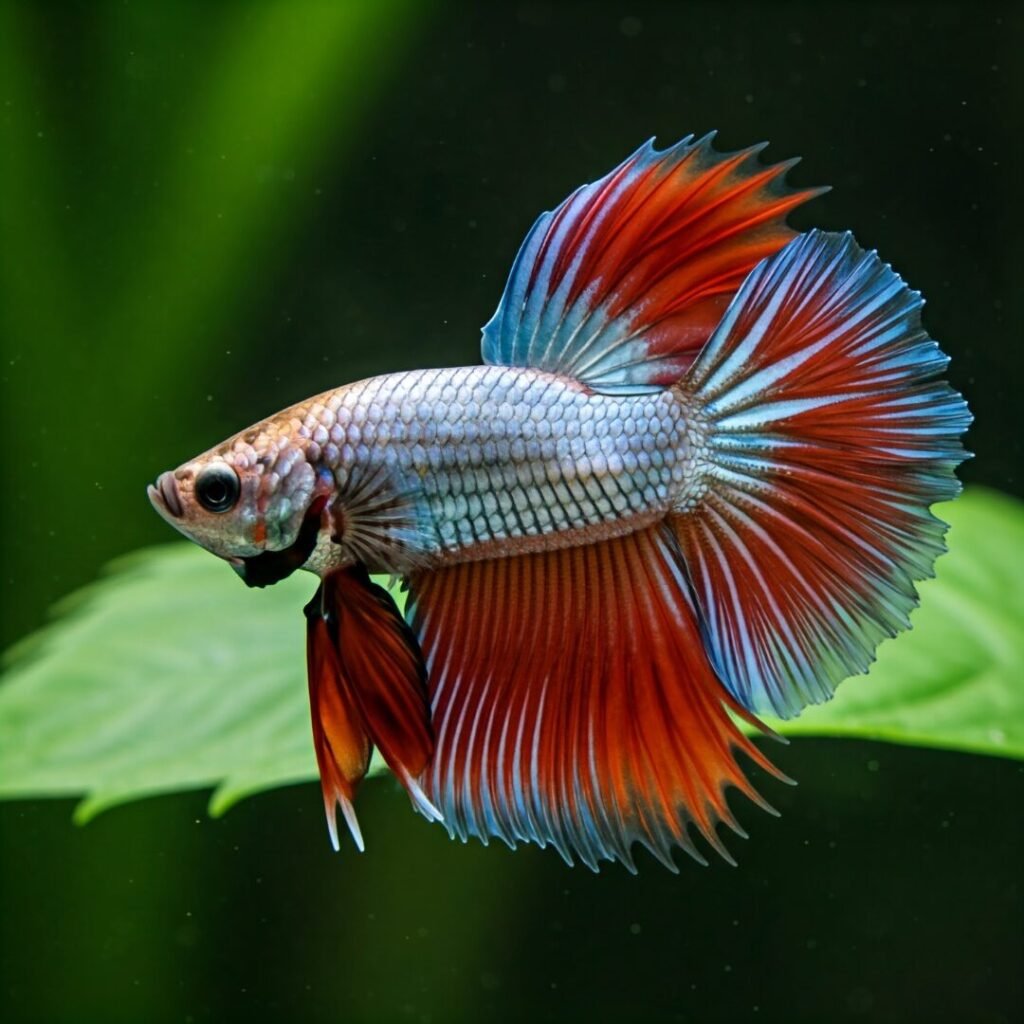Introduction
The Betta Fish or Siamese fighting fish is a colorful, finned fish that is admired for its flowing fins and colorful personality. Indeed, they are among the best known of all fresh water aquarium fish among hobbyists all over the world.
A key question every betta owner asks is about the Lifespan of the betta fish. This detailed article “How Long Do Betta Fish Live? What Is Betta Fish Lifespan”, explores how long bettas live, the things that affect their lifespan, and how to make sure that you have a happy, healthy pet.

Betta Fish Lifespan: Wild vs. Captivity
In the Wild:
Naturally native to the rice paddies, ponds or swamps of Southeast Asia are the betta fish. They have a lot of cover and breeding grounds. Their life in the wild, however, is also limited by those predators, the limits of food resources, and environmental changes, so their Lifespan is generally 2–3 years at most.
In Captivity:
In captivity, bettas need to serve 3 – 5 years, but with special cases that last upto 7 years. In home aquariums, however, they outlive that period in a controlled environment on a nutritious diet and protected from predators.
Life Stages of a Betta Fish
- Egg Stage: Betta fish are actually egg laying fish, though, and start out as eggs that hatch within 2 – 3 days.
- Fry Stage: It is rapid growth; fins and colour develop in weeks.
- Juvenile Stage: Bettas start to show vibrant colors at around 2–3 months.
- Adult Stage: Maturity for bettas can reach complete status by 6 months and will reach their prime.
- Senior Stage: Once bettas become 2–3 years old, they begin their senior phase of their life, which means that you’ll have to take good care of them.
Factors Affecting Betta Fish Lifespan
Tank Size:
We recommend a tank size of at least 5 gallons. Because smaller tanks can cause stress, restrict movement and have negative impacts of the health of your fish.
Water Quality:
Vital are clean, filtered water. Stress can be induced by poor water quality which can lead to such diseases (like fin rot). Parameters should be monitored regularly, most importantly: pH (6.5–7.5); and ammonia (0.06 mg/L).
Betta Fish Environment:
Nurture with plants, rocks, hiding spots that will mimic their natural habitat and reduce stress. A well decorated tank also gives mental stimulation.
Temperature:
Tropical fish, bettas do best in water at 76–82°F (24–28°C). This can weaken their immune system by sudden temperature fluctuations.
Diet:
A balanced diet is essential. To keep your bettas fed properly it’s best to feed them high quality betta pellets, as well as frozen or live foods like brine shrimp and bloodworms as well as treats from time to time.
Tank Mates:
Betta fish are territorial. For tank mates go with peaceful snails or small schooling fish. Stress or harm occurs with aggressive species so avoid them.
Genetics:
Bettas with stronger immunities and longer Lifespans are created by healthy breeding lines. Poor genetic traits can cause shorter Lifespan or be causes of health troubles.
Attention and Care:
Feeding, water changes and monitoring behavior is very important and consistent. If you see any signs of stress (letargy, loss of color) you need to pay attention.
Diseases:
The problem is fin rot, ich, and velvet and these can shorten Lifespan. Complications can be prevented, however, if there is early detection and treatment.
Age at Purchase:
The bettas sold in stores are usually 6 months old. When you buy a younger betta you have more time to enjoy their company.
Tips to Improve Betta Fish Lifespan
- Maintain Water Quality: Use a good filter and perform 25–50% water changes weekly.
- Provide a Balanced Diet: Information be offered to prevent malnutrition which include offering variety. How Long Can Betta Fish Survive Without Food?
- Enrich Their Environment: Keep them active by using plants, caves and toys.
- Monitor Tank Conditions: Keep from overcrowding and having stable temperatures.
- Choose the Right Tank Mates: Do not house aggressive or finnipping species.
These tips will help you to take care of your beloved betta fish and will give them the longest, healthiest life possible.
Tips to Care For Older Betta Fish
As bettas age, they require extra attention:
- Lower Water Levels: This would help them rise easier to the surface to catch air.
- Soft Diet: Feeding easy to digest foods like daphnia or softened pellets would help.
- Calm Environment: Try not to change their tanks drastically, and put stress on their habitat.
- Monitor Health: During this period, watch for signs that your reptile may be ill—bloating, loss of appetite and faded colors, among other things.
Signs of a Healthy Betta Fish
A happy and healthy betta displays:
- Bright, vibrant colors
- Active swimming behavior
- A strong appetite
- It interacts with its environment and its owner.
If you see lethargy, clamped fins or discoloration, look at these issues quickly, to avoid health problems.

Conclusion
As everyone knows, Betta fish are beautiful, smart creatures that will add beauty and bring joy to any aquarium. This detailed article “How Long Do Betta Fish Live? Comprehensive Guide to Betta Fish Lifespan” helped you to take the proper care, so that your betta fish can can have a long, full life. Keeping the tank clean, feeding him a nutritious diet, and keeping his environment stress free will greatly increase his lifespan and make your betta’s home a good one.
Remember: “A Healthy Betta Is A Happy Betta.”
Frequently Asked Questions
1. How long does a betta fish live for?
Under optimal care, Betta fish generally live 3 – 5 years.
2. How old can betta fish get?
Bettas live 6 – 7 years with exceptional care, yes.
3. How many times should I feed my betta?
Overfeeding can lead to conditions ranging from constipation to life threatening diseases, so feed your betta just 1 – 2 times a day in small amounts.
4. Can bettas live in a bowl?
Although bettas can live in bowls we don’t advise doing it. They need a proper tank (with filtration and heating).
5. What signs tell me my betta is stressed?
Indications of stress are lethargy, dullness in colors, loss of appetite and aggression.
6. Can Betta fish live together?
Female Betta fish can live together in groups, but males should be kept alone to prevent aggression.
7. How do I know if my Betta is happy?
A happy Betta fish is active, displays vibrant colors, and interacts with you and its environment.
8. What diseases are common in Betta fish?
Common diseases include fin rot, ich, and velvet. Regular tank maintenance can help prevent these illnesses.
9. How long do male betta fish live?
In regards to the life expectancy of betta fish male and female have the same expectancy and so as long as each fish is placed in an environment of its choosing they will both live healthy lives.
10. How long do female betta fish live?
Females have the same life expectancy as males, yet it does appear that they live about a few months longer.

